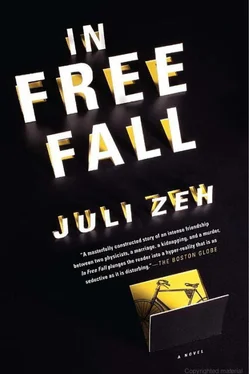His lectures are popular. They give the students the impression that he has cracked the phenomenon, and that he will lead them out of their everyday ideas into a new understanding of time.
In truth, Sebastian has not even grasped his own typology of waiting. He has blithely overlooked an important category. It does not have much to do with time at all—at most, with the suspension of it. It is a waiting that is completely absorbed in itself and does not allow for any distractions: no watching TV or reading a book; no eating and no going to the toilet. This waiting consists of preventing reason from collapsing, and keeping the body from committing suicide. It is the waiting of one who is falling for an impact that does not come.
SEBASTIAN IS SITTING with his head tipped back against the sofa. His hands are lying on his thighs and his feet are shoulder-width apart. The body does not need a sense of equilibrium in this position. Even a dead man could maintain his balance. Through half-closed eyes he gazes at the upper half of a bookcase, the luxuriant tufts of a houseplant occupied with producing ten shoots a week, the top edge of one of the paintings that Maike has on loan from the artists in her gallery. Lots of red on a black background. He cannot remember the title of the painting. Even so, he is perfectly happy with what lies in his field of vision. Nothing is bothering him as his thoughts shuttle between two points to no avail. On one side, the conviction that continuing to obey instructions is the only right thing to do (no police, tell no-bo-dy). On the other side, the fear of endangering the life of his son through inaction. There is no room for other considerations. Not for asking how long it will take till they get in touch with him. Nor for the thought that he should at least be happy the police have not shown up: every passing minute gives him hope that he has managed to get away with the crude murder.
The sun has set; the air no longer smells of Liam alive somewhere. There is nothing to indicate that Sebastian’s waiting is not the start of a lifelong vigil. His beard is growing, and his fingernails and hair, too. It is dark for a long time; then it slowly grows light.
THE RUMBLING IN HIS STOMACH STOPS just before noon the next day. The stores of sugar and protein have been used up, and the body is setting to work on the fat reserves now. The pain in his back had become unbearable at some point and finally disappeared. Sebastian is no longer sitting on the sofa, but has become part of it. He has blurred at the edges and is now a permanent part of the room that is part of this building, which is in a town in a network of streets, train tracks, waterways, and flight paths that stretch all over the earth, which revolves around a sun, which is part of the Milky Way, and so forth. Sebastian is in a state between waking and sleeping, interrupted by moments of consciousness in which he knows that, regardless of what the future brings, he will never again be the person that he once knew. That he can never return to what his life used to be.
The ring of the telephone has the force of a stroke. His body contracts and his left arm jerks convulsively. Sebastian first knocks the telephone off the table, then presses it to his ear, as if he wants to connect it directly with his brain. He conducts a conversation whose sense he understands only afterward. Maike once again talked about mountains, wind, and good weather, and asked if everything was all right. Laughing, she put Sebastian’s halting replies down to his total isolation in the wasteland of physics. She didn’t have much time, she was going out for dinner, and Sebastian did not want to speak for long either, he was in the middle of an important train of thought.
When the telephone is lying in front of him once again, he is trembling with rage. The wrong phone call has made the absence of the right one a hundred times worse. His agitation drives Sebastian to get off the sofa and walk through the apartment. His arms start jerking again, with a violence that increases the racket in his head to a mocking volume. Sebastian tugs one drawer after another out of the cupboard in the living room and throws them down to the floor until he has found his pocketknife. He scratches his swollen insect bites with the blunt side of the blade—the letting of blood brings relief. He drives the knife into the side of the armchair. He punches door frames and kicks over chairs. Newspapers fly through the air like startled birds. A vase hits the wall and leaves a water stain in the shape of a hand held up in defense. Sebastian beats his head against the stain until the room around him has turned into a monotonous hum. At some point he stands on the balcony sucking air into his lungs, clinging to the railing as if it is that of a ship racing into the oncoming night with breathtaking speed. When a pigeon lands in a flower box, he screams at it. Where is my son, you airborne rat, you scavenger, where is Liam?
He makes a grab for the bird and the tips of his fingers graze its tail feathers before the startled animal drops over the edge of the balcony. Showing that waiting is not without its dangers.
OSKAR PICKS UP THE PHONE AFTER THE SECOND RING.
“Forget it, Jean!”
“Who’s Jean?”
“Sebastian!” Oskar’s laugh of relief would certainly have made Jean, whoever he was, happy. “I’ve been waiting days for you to call.”
It’s clear that Oskar is still smiling during the pause that follows. A sofa creaks. Sebastian can imagine Oskar, wearing the black trousers and white shirt that suit him so well, stretching his legs out leisurely. He must have only just come home. At night, he had told Sebastian once, you can fish people from Geneva like trout from an over-full breeding pond.
Sebastian is sitting hunched over at the dining table, in the same place as the last time he had dinner with his family and with Oskar, not so long ago. His shirtsleeves are rolled up and his arms are crusted with blood. The pale material of his suit is also stained in many places. He can smell himself with every movement. The sweat of fear and sleeplessness and the stink of waiting—he can no longer tell how many days it has lasted.
“What time is it?”
Oskar’s smile turns once again to laughter. “Have you rung to ask what the time is? It’s three in the morning.”
“My God,” says Sebastian. “It’s going to be light soon.”
“You sound odd. As if you were a thousand light-years away and had been dead for a thousand years.”
“That’s about right.”
There is a certain tone of voice, a darkly vibrating melody in the undertones, that sets in whenever Oskar and Sebastian speak to each other on their own. The sound of their voices together creates an intimate space cut off from the rest of the world. To create this space, Sebastian sometimes closes his office door and rings Oskar’s work number. Then he asks him how his day has been, if he’s making progress with his work, and what the weather is like in Switzerland. Now, too, he feels the desire to get Oskar talking, to ask him about how his night has been and to listen to him talk about who he has met and what he has been doing. Lulled by the familiar tones, he would put down the telephone after a while and surrender himself to the emptiness from which he has been trying to escape by calling Oskar.
“Why have you been expecting me to call?” Sebastian asks.
“So that you can tell me the end of the Many-Worlds fairy tale.”
Sebastian has not thought about Circumpolar at all. In retrospect, his agitation over it seems so ridiculous that his forehead and cheeks grow warm with embarrassment.
“It’s about something else,” he says quickly. “I’ve killed a man.”
“Oh?” Oskar says.
Читать дальше












